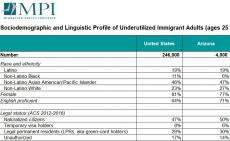Brain Waste among U.S. Immigrants with Health Degrees: A Multi-State Profile
The coronavirus pandemic that swept into communities across the United States beginning in Spring 2020 has placed enormous strain on health-care systems and highlighted the work of both U.S.- and foreign-born health professionals. But even as the need for testing, treatment, and care is high, an estimated 263,000 immigrants and refugees with at least a four-year degree in a health field have largely been sidelined, either employed in jobs that require no more than a high school diploma or out of work.
This fact sheet offers the first state-level profile of this untapped pool of immigrant health professionals. Using data from the U.S. Census Bureau and U.S. Department of Labor, it provides estimates of the number and key characteristics of underutilized immigrants with health degrees, including their English proficiency, the other languages they speak, their top fields of study, and the legal statuses they hold.
Among the key findings of this analysis are that these immigrants are widely distributed across the United States, not concentrated in traditional immigrant-gateway states. There is also considerable overlap between the languages other than English that they speak and those spoken by Limited English Proficient populations in the states where they live, making them a potentially valuable resource in providing linguistically and culturally competent care.
1 Introduction
2 State-Level Numbers and Characteristics of Underutilized Immigrant Health-Care Professionals
A. Geographic Distribution
B. English Proficiency
C. Linguistic Competency
D. Top Three Fields of Study
E. U.S. Citizenship and Legal Status
3 Conclusions



